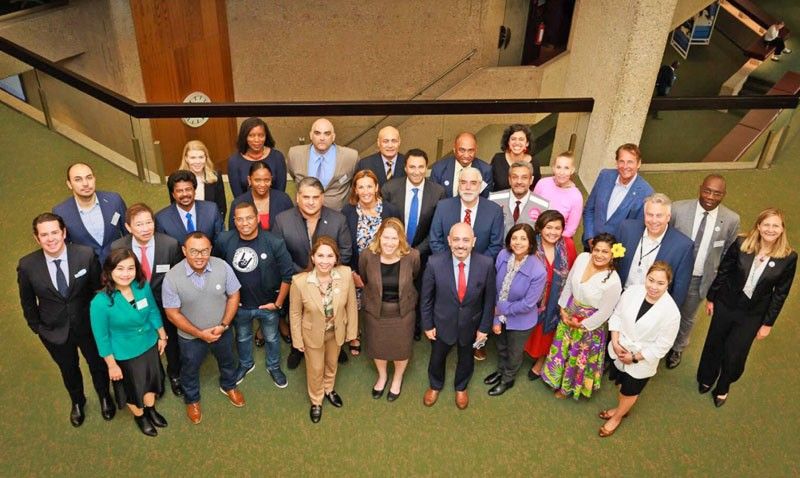PDRF showcases work at UN conference in Geneva

MANILA, Philippines — The Philippine Disaster Resilience Foundation (PDRF) and private sector representatives from 14 countries from the UN’s Connecting Business Initiative met recently in Geneva in person for the first time in two years at the eighth Humanitarian Networks and Partnerships Weeks (HNPW) hosted by the UN Office for the Coordination of Humanitarian Affairs (OCHA) and the Swiss Agency for Development and Cooperation.
Participants shared experiences and best practices about the role of local businesses in preparing for, responding to and recovering from disasters.
The group identified the fight against the climate crisis and localization of humanitarian response as the key issues where local businesses can help make a difference in people’s lives. “Humanitarian action is all about bringing people together.
When a disaster strikes, first responders are the local communities, the local businesses. For OCHA, the private sector is one of our most important partners to collectively respond better and quicker,” said Edem Wosornu, chief of OCHA’s Response Support Branch.
PDRF president Butch Meily was a resource speaker during the session entitled, “Act local, think global: humanitarian action and the private sector” along with representatives from the United States Agency for International Development (USAID), the Alliance for Risk Management and Business Continuity and the Asia Pacific Alliance for Disaster Management Sri Lanka.
“Love is stronger than hatred. Light is stronger than darkness. Looking out at all of you coming from all over the world and gathered here to do good, I am reminded of how each of us in our own way is a lamp that glows in the night giving light and hope to everyone,” said Meily.
“COVID-19 has brought a renewed sense of urgency in the need to support local and national actors. When countries went into lockdown, in many cases there were only local actors to deliver assistance,” explained Marcos Neto, director of UNDP’s Sustainable Finance Hub.
“But local businesses need support, they need to be involved in decision-making processes of humanitarian response, and they have the means to deliver assistance in accordance with humanitarian principles.” PDRF executive director Veronica Gabaldon spoke at the session “Feeling the Heat, how local businesses respond to the climate emergency,” which highlighted examples of climate action from the Fiji Business Disaster Resilience Council, the Turkish Enterprise and Business Confederation, the Madagascar Private Sector Humanitarian Platform and UNICEF.
“Businesses, specifically MSMEs (micro, small and medium enterprises), are among the hardest hit by climate change and so innovative and sustainable solutions need to be created and implemented to help them adapt better,” said Gabaldon.
More than 6,000 participants from United Nations agencies to non-governmental organizations, academia and the private sector are still working on key topics in today’s humanitarian field and how better to partner to address them.
PDRF also participated in the final public session, “Acting before crises hit: anticipatory action and the private sector,” in partnership with the International Federation for the Red Cross and the Anticipation Hub, focusing on how businesses can support the ongoing shift to more effective, efficient and dignified humanitarian response through anticipatory action.
PDRF’s head of Development Programs and Innovation Anna Katrina Aspuria made the case for the importance of anticipating and preparing for a disaster before it happens. She cited the need to involve the private sector and non-traditional humanitarian actors in ensuring that resources are put in place to help communities protect themselves earlier.
Founded in 2016 in Istanbul at the World Humanitarian Summit, the Connecting Business Initiative is a joint program of the United Nations Development Program and United Nations Office for the Coordination of Humanitarian Affairs to support private sector engagement before, during and after disasters.
- Latest
- Trending





























